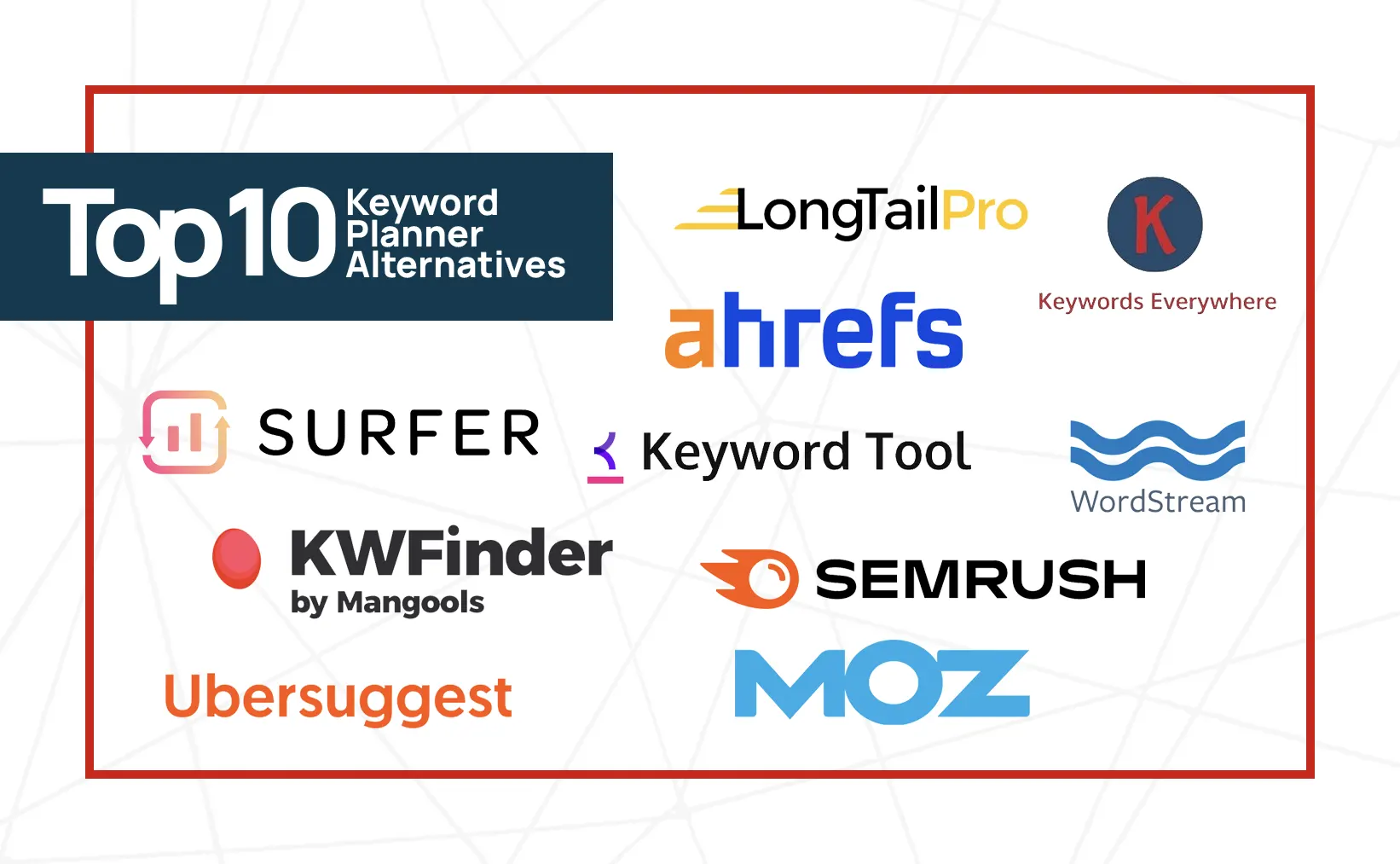Keyword Research for your Google Ads Campaigns
Contents
Introduction
In the realm of digital advertising, the foundation of success often begins with a deceptively simple yet immensely powerful element: keywords. Keywords are the compass that guides your Google Ads campaigns, and the meticulous process of uncovering and selecting the right keywords is what we refer to as “Keyword Research.” This fundamental practice is the keystone upon which highly effective and ROI-driven Pay Per Click (PPC) campaigns are built.
Keyword Research is not a mere task; it’s a strategic art form. It involves delving into the psyche of your target audience, understanding their search behaviors, and aligning your ad content with their intentions. But how do you embark on this journey of discovery? This is where the Google Keyword Planner, an indispensable tool, comes into play. It’s your gateway to a treasure trove of insights, offering keyword suggestions, search volume data, and competition analysis.
In this article, we’ll take a deep dive into the significance of Keyword Research in the context of Google Ads campaigns. We’ll unravel the strategies, tools, and best practices that underpin successful PPC endeavors.
Moreover, for businesses seeking to navigate this intricate landscape with finesse, agencies like FrontFold serve as trusted guides. With our expertise in Keyword Research and Google Ads management, we help businesses benefit from the wealth of data and insights, ensuring every click on your ad translates into value.
So, let’s embark on this exploration of the vital art and science of Keyword Research, and how it shapes the destiny of your Google Ads campaigns, with the understanding that expert guidance can make the journey even more rewarding.
The Foundation of Google Ads Success
In the ever-evolving realm of digital advertising, Google Ads has emerged as a powerhouse for businesses to connect with their target audience. At the heart of any triumphant Google Ads campaign lies a fundamental element: keywords. These seemingly ordinary words and phrases are the bedrock upon which the success of your campaign is built.
Keywords: The Cornerstone of Google Ads
Keywords are the words or phrases that users type into the Google search bar when seeking information, products, or services. Understanding their significance is pivotal. Keywords serve as the bridge connecting your ad to potential customers. When a user’s search query aligns with your chosen keywords, your ad has the chance to shine.

The Role of Relevance and Targeting
Relevance is key in the world of Google Ads. Your chosen keywords must be closely aligned with your business offerings and the intent of your potential customers. A well-crafted keyword strategy ensures that your ads are shown to individuals actively seeking what you provide.
Moreover, targeting is the precision tool in your arsenal. It involves understanding your audience’s characteristics, behaviors, and demographics, allowing you to tailor your ads to reach those most likely to convert.
The Intersection of Competitive Analysis and User Intent
To truly harness the potential of keywords, competitive analysis is essential. Understanding how your competitors are utilizing keywords can help you refine your own strategy and stand out in the crowded digital marketplace.
User intent, another critical factor, revolves around deciphering what a user is truly looking for when they enter a specific keyword. By aligning your keyword choices with user intent, you increase the likelihood of delivering the right message to the right audience at the right time.
In the upcoming sections, we’ll delve deeper into the world of Keyword Research, Competitive Analysis, and User Intent, uncovering strategies to help you maximize the impact of your Google Ads campaign and ensure that your digital advertising efforts are both effective and efficient.
Benefits of Comprehensive Keyword Research
In the realm of digital advertising, the adage “knowledge is power” holds particularly true. In the context of Google Ads campaigns, knowledge translates to understanding your audience, their needs, and the key to unlocking the full potential of your advertising budget. This is where comprehensive keyword research steps into the limelight, offering a multitude of benefits that can significantly impact the effectiveness and return on investment (ROI) of your campaigns.
Precision Targeting with Long-Tail Keywords:
Comprehensive keyword research allows you to uncover long-tail keywords – those specific, often multi-word phrases that users employ when they’re close to making a decision. Long-tail keywords may have lower search volumes, but they come with a silver lining – they tend to be more relevant and carry higher conversion potential. By incorporating these gems into your campaign, you can tap into a pool of highly motivated, ready-to-convert prospects.
Cost-Efficiency with Low Competition Keywords:
In a competitive advertising landscape, bidding on highly competitive, broad keywords can quickly eat into your budget. Thorough keyword research enables you to identify low competition keywords that are still relevant to your business. Targeting these keywords often leads to lower click costs, making your advertising budget work harder and go further.
Enhanced Campaign Relevance:
Keyword research ensures that your campaigns are laser-focused on what matters most to your audience. It enables you to align your ad copy, landing pages, and offerings with the precise needs and intentions of your potential customers. The result? Improved ad relevance, higher click-through rates, and better quality scores, all of which contribute to lower costs per click and higher ROI.
A Competitive Edge:
By investing time in comprehensive keyword research, you’re gaining insights into your competitors’ strategies and discovering gaps in the market that others may have overlooked. Armed with this knowledge, you can craft campaigns that stand out and reach audiences that your competitors might be missing.
In essence, comprehensive keyword research is the compass that guides your Google Ads campaigns toward success. It empowers you to make informed decisions, optimize your budget, and ensure that your ads reach the right audience at the right time, ultimately contributing to enhanced campaign effectiveness and ROI.
Methods and Strategies for Keyword Research
Keyword research is both an art and a science, a pivotal step in shaping the success of your Google Ads campaigns. To embark on this journey effectively, you need a toolkit of methods and strategies that encompass the nuances of understanding user intent, competitive analysis, and leveraging the right tools such as the Google Keyword Planner.
Google Keyword Planner:
A cornerstone of keyword research, the Google Keyword Planner is a treasure trove of insights. It not only offers keyword suggestions but also provides essential data like search volumes and competition levels. Start by entering seed keywords related to your business, and let the tool unveil a wealth of potential keywords and phrases that can drive your campaign’s success.
Competitive Analysis:
A keen eye on your competitors is another invaluable strategy. By analyzing the keywords they are targeting, you can identify gaps and opportunities in your own strategy. Are there keywords they’re overlooking, or ones where you can outperform them? Competitive analysis can help you fine-tune your keyword selection.
User Intent Analysis:
Understanding the intent behind a user’s search query is paramount. Are they seeking information, comparing products, or ready to make a purchase? User intent analysis allows you to categorize keywords based on intent and tailor your ad messaging and landing pages accordingly. This alignment enhances the user experience and increases the likelihood of conversions.
Expert Insights from FrontFold:
At FrontFold, we bring a strategic edge to keyword research. Our team combines industry expertise with cutting-edge tools and technologies to uncover hidden gems and strategic insights. We delve deep into your niche, identifying not only the most promising keywords but also the most effective ways to use them. It’s not just about finding keywords; it’s about finding the right keywords that align with your business goals.
By integrating these methods and strategies into your keyword research process and, where needed, seeking expert guidance, you can elevate your Google Ads campaigns to new heights. Keyword research isn’t just about identifying keywords; it’s about gaining a profound understanding of your audience, competitors, and the digital landscape, ultimately ensuring that your campaigns are both effective and efficient.

Selecting the Right Keywords
In the intricate landscape of Google Ads campaigns, the choice of keywords can be the defining factor between success and obscurity. It’s not just about quantity; it’s about the quality and relevance of your chosen keywords. Here’s why selecting the right keywords matters:
Relevance Is Key: Relevance is the North Star of keyword selection. It’s not about gathering a multitude of keywords from the Google Keyword Planner; it’s about identifying those that truly resonate with your business offerings and user intent. Opt for keywords that align seamlessly with what you provide.
The Power of Long-Tail Keywords: Long-tail keywords may have lower search volumes, but they come with a distinct advantage – they are highly specific. These phrases reflect user intent more precisely, often indicating a potential customer closer to the conversion stage. Incorporating long-tail keywords can lead to better click-through rates and improved conversion rates.
The Appeal of Low Competition Keywords: Highly competitive keywords can be expensive to bid on and may not always yield the best results. Low competition keywords, on the other hand, offer an opportunity to reach your target audience without breaking the bank. They may have fewer searches, but they often come with lower click costs and can be incredibly effective in niche markets.
In essence, it’s not about amassing an exhaustive list of keywords; it’s about strategic selection. Ten well-chosen, highly relevant keywords can outperform hundreds of loosely related ones. It’s about quality over quantity, precision over abundance. By focusing on the right keywords, you can ensure that your Google Ads campaigns resonate with your audience, maximize your ROI, and achieve tangible results.
Best Practices in Keyword Research
When it comes to keyword research for Google Ads campaigns, a strategic approach is paramount. Here, we present a concise list of best practices to elevate your keyword research game:
- Keyword Match Types: Utilize different keyword match types – broad match, phrase match, exact match, and broad match modifier – to fine-tune the reach of your ads. Exact match ensures precision, while broad match can capture variations and expand your audience.
- Keyword Clustering: Group related keywords into clusters based on themes or user intent. This approach helps in organizing your campaigns efficiently and tailoring ad messaging to specific keyword groups.
- Negative Keywords: Equally important as selecting the right keywords is excluding the wrong ones. Negative keywords prevent your ads from showing for irrelevant queries, conserving your budget and improving campaign relevance.
- Regular Review and Updates: The digital landscape is dynamic. Regularly review your keyword lists and adjust them based on changing trends, seasonality, and performance data.
- Quality Score Optimization: Improve your Quality Score by ensuring that keywords align with ad copy and landing page content. A higher Quality Score can lead to better ad positions and lower costs.
- Long-Tail Keywords: Embrace long-tail keywords, which often have lower competition and higher conversion potential. They cater to specific user queries and can be cost-effective.
- Competitive Analysis: Continuously monitor your competitors’ keyword strategies and identify opportunities to outperform them.
- User Intent Consideration: Always keep user intent in mind. Craft ad copy and landing pages that align with what users are looking for when they search with your chosen keywords.
By following these best practices, you can enhance the effectiveness of your keyword research efforts and optimize your Google Ads campaigns for better performance and ROI.

The Future of Keyword Research in Google Ads
As the digital landscape continues to evolve, so does the future of keyword research in Google Ads. Emerging trends and technologies are poised to reshape how we target keywords:
- Machine Learning: Expect increased reliance on machine learning algorithms to analyze vast datasets, uncover new keyword opportunities, and fine-tune keyword strategies.
- Voice Search Optimization: With the growing popularity of voice-activated devices, keyword research will adapt to conversational queries, focusing on natural language and context.
- Semantic Search: Keyword targeting will shift toward understanding user intent and delivering content that matches the meaning behind search queries.
- Behavioral Insights: User behavior and search patterns will play a more prominent role, allowing for dynamic keyword adjustments in real-time.
- Privacy and Ad Preferences: As user privacy becomes paramount, keyword research may pivot toward more privacy-conscious methods to manage ad preferences.
In the ever-evolving digital advertising landscape, the future of keyword research will be characterized by adaptability, user-centricity, and a harmonious blend of human insight and machine intelligence.
Alternatives to Google Keyword Planner
Discovering the right keywords is paramount for driving traffic to your website. While Google Keyword Planner has been a staple in the SEO community, its limitation of providing exact monthly volumes only to accounts running ads has led to the exploration of alternatives. Here are some top-notch substitutes:

- Surfer SEO:
- Offers a freemium version and a paid version starting at $49/month.
- Provides a rich variety of keyword suggestions.
- Ahrefs:
- Known for its vast keyword database of over 7 billion keywords.
- Provides multi-platform keyword data, not limited to Google.
- Pricing starts at $99/month.
- Semrush:
- Delves into related keywords for ad ideas and discovers low-competition keywords.
- Freemium version available, paid plans start at $108.33/month.
- Ubersuggest:
- Offers extensive keyword suggestions based on what’s working for competitors.
- Free trial available, paid plans start at $12/month.
- Keyword Tool:
- Specialized in generating long-tail keywords in real-time.
- Supports international SEO with pricing starting at $69/month.
- Moz:
- Known for seamless keyword management and has a 30-day free trial.
- Paid subscription starts from $79/month.
- KWFinder by Mangools:
- Simplifies competitor keyword analysis.
- Paid plans start from $19.9/month.
- KeywordTool.io:
- Provides valuable data on keyword trends and competitor analysis.
- Known for its question-based keywords feature.
- LongTailPro:
- A robust tool for finding long-tail keywords with competitor analysis features.
- WordStream:
- A free keyword research tool providing comprehensive data and insights on keyword suggestions, search volume, and competition level.
Each of these tools has its own set of features that cater to different aspects of keyword research, be it long-tail keyword discovery, competitor analysis, or multi-platform keyword data. With the right mix of free and paid plans, these tools offer a viable alternative to Google’s Keyword Planner for marketers looking to optimize their SEO strategies
Conclusion
In the dynamic world of Google Ads, keyword research remains the linchpin of success. It’s not merely a task but a strategic journey, powered by tools like the Google Keyword Planner. At FrontFold, we specialize in turning this journey into a streamlined process, ensuring best practices and maximizing your ROI. Partner with us today and watch your Google Ads campaigns flourish. Your success is just a click away!
Unlock your Google Ads potential with FrontFold. Contact us now!
Get a personal consultation.
Call us today at +918197978138
A lot of clarity can be gained if we just talk to each other for 5mins.



